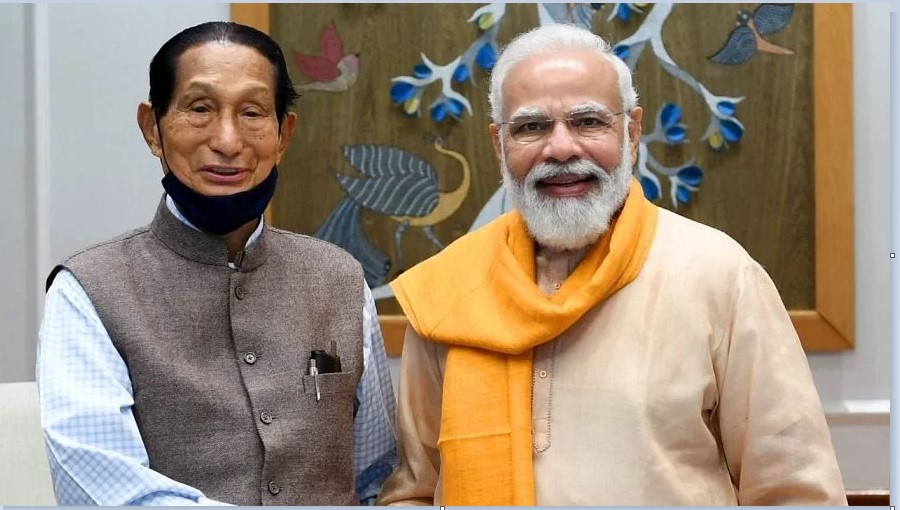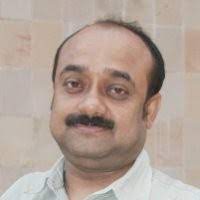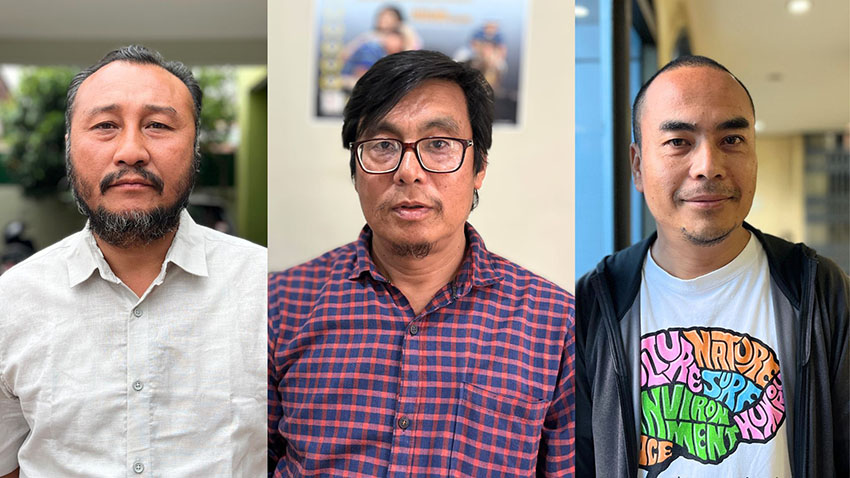Veteran Naga leader and former Chief Minister, S C Jamir, has said that it will not be prudent to “waste our precious time on English phrases like deadlock or finally
resolved etc etc”.
In a free-wheeling interview with this journalist Dr Jamir said, “It is a fact that the matter appears to be in limbo. This is not the time to find fault with each other but to put our heads together in a spirit of unity and deep concern for the future of Nagaland”.
Answering a question referred to his only meeting with Thuingaleng Muivah, NSCN(IM) general secretary some years back, and said: “For the first time I met Muivah on that day.
Our discussions were in the presence of his Kilonsers and Ao Senden Office bearers. When I provoked Muivah for his inability to find solution with the Govt of India even after more than six to seven years of negotiation, may be out of anger or probably his conscious might have pricked him and he said that “I have asked the Govt of India not to put any conditions so that I will also not raise the issue of sovereignty.”
I think as a Naga he spoke out the truth”.
He also said, ” …..Furthermore neither sovereignty nor Integration appear in the two
official Agreements between two groups of the underground. My first and last meeting (with Muiavah) was at Delhi and while departing from the scene while shaking hands; Muivah told me, “Jamir so we may not meet again” I too replied “no need because I told you everything during the discussions” and then everybody laughed.
Extracts of the Interview:
S C Jamir in Conversation: Freedom to sail farther…. “In Calcutta, I worked as peon at the hostel I stayed for my studies”
Question (Nirendra): Let us have a detailed discussion on contemporary Nagaland politics and the general situations in the rest of India. My idea is to make this interview more probing and detailed. Let us make it informative for the younger generation and so let me also refer to episodes and issues in your life which have not been discussed in the media earlier….say your hostel life in Calcutta and Allahabad and books you used to read in younger days.
S C Jamir: It looks a good idea, and I am prepared to share my fond memories of both my College as well as University days at Scottish College, Calcutta and University of Allahabad respectively. As I came to the city for the first time in 1952 to study Intermediate Arts at Scottish Church College, compared to other students from advanced states, we were almost primitive in all respects. I decided to meet the Principal of the College Dr John Kellas in his office and as I reached the place there was a long queue in the entrance which I had never seen nor understood its meaning.
I forced myself to enter the Office during which many of them shouted at me innocently. I succeeded in entering the Office. I submitted a short application for a Free scholarship in the College and the Principal just looked at me and asked why do I require the scholarship. I just told him that I don’t have the means to meet to pay fees and other charges to the College. He just smiled and wrote on my application “YES” and these three letters covered all my expenses in the College all through when I joined Allahabad University for B.A LL.B course I had the same financial problem.
Before admission in the University I approached Dr C.M. Chatterjee, who was the Principal of the William Holland University College under Allahabad University to find out a means to earn something to meet the expenses in the hostel.
He asked me to work as a Peon for the hostel, and I readily accepted the offer. Thereafter, I was asked to go for a short course for Library which I did and after completion of my diploma in Library Science I was appointed as one of the Librarians in Holland Hall and I continued till I completed my studies in the University. Except monthly fees in the University all expenses for room rent as well as mess fee were met by the Institution.
Nirendra : Which subjects attracted you most? What about books on classic literature, I mean the translations and books on Marxism etc?
S C Jamir: I read non-fiction mainly. Most books I read were on politics and of course biographies. Slowly they started leaving impressions on me. And I continued reading even in Allahabad while doing the law. My interests were Law and International relations and accordingly I used to learn more about these subjects by reading books concerning these subjects. The spirit of Indian nationalism was still vividly visible with the younger generation. There were no feelings of communalism nor parochialism.
Every citizen was proud to be an Indian citizen. There was an organization known as “ Students Christian Movement” at Allahabad in which they elected me first as General Secretary and thereafter President of the organization even though there were only five students from Naga Hills. Both students from the South and the North unanimously elected me. This was the kind of India in the fifties and even in the sixties. My studies in Allahabad University laid a firm foundation for my political career.
Since my aim and commitment was to join politics, I refused my appointment as Circle Officer at Phogoboto and actively participated in Naga politics immediately after graduation in Law in 1958. To be precise I started my political career on 21st May 1958 when I was elected as Joint Secretary of the Naga People’s Convention.
Unfortunately, in their mistaken and often comforting belief of complete knowledge and factual consciousness, some of the leaders are perilously inclined to apply distorted logic, analyze half-cooked information and draw faulty conclusions on matters requiring detailed and meticulous understanding and scrutiny.
Nirendra: From the national and global stage, can you tell us about the personalities who impressed you? Did you have or create any role models?
S C Jamir: Well, we did not have time for all that leisure…..But people around you and global leaders will always leave an impact. Nehru was a great person of that era. He had vision and quite a scientific temperament. I was fortunate to be appointed as Parliamentary Secretary attached to the Prime Minister. Nagaland was then under the Mministry of External Affairs and Nehru himself handled that portfolio.
Those days I got opportunities to learn a lot. India was coming up, but back home my own Naga people were suffering. But we started drawing inspiration from one another….private concerns were quickly put aside.
The second person Shri Jairam Das Daulatram, former Governor of Assam and Member of the Rajya Sabha, was really my Guru. He taught me from A to Z about Indian politics and also the functioning of Parliament in a democracy.
Nirendra: We understand the repression meted out to Nagas was unparalleled but common Nagas were ready to sacrifice their utmost…People really united under the leadership of A Z Phizo and NNC?
S C Jamir: Well, that’s true. There can be no shadow of doubt that the Naga National Council formed at Wokha in 1946 was the only empowered and truly representative institution authorised to reflect genuine aspirations of the people. The entire Naga community rallied willingly and devotedly behind the NNC. People wanted peaceful resolution and through purely ‘democratic means’. Nagas stayed away from violence initially for long but it is true the excesses and atrocities inflicted on the helpless Nagas by Assam Police personnel compelled the NNC to raise their hands in self defence and this ultimately led to incessant violent conflicts.
Unfortunately, the cycle of violence and bloodshed wreaked unprecedented havoc…Exploitation of Nagas in Nagaland state continues even today. There may not be killings at the large scale, but there is unabated extortions which is becoming too much a burden some for the common people and added to this the Damocles’ swords of fear psychosis continues in the minds of the people at all levels.
So far the people of Nagaland are in the dark as they were never consulted nor taken their consent while drawing political agreements.
Nirendra: There have been several attempts to arrive at peace. Your 16 Point Agreement to start with and then few other attempts. In 1997 when you were Chief Minister, the ongoing ceasefire and peace talks started.
S C Jamir: (Smiles). The ceasefire arrangement was made from the backdoor. State government was never consulted for the matter. But have we achieved what we were supposed to? In the past too there were challenges. The Nagas valiantly endured and struggled ahead….In the sixties and so, it was a glowing tribute to the mighty and mettle of the Naga courage that not a single Naga left the state to migrate. But look what has happened in the last two decades or so. Extortion has crippled people and the Naga economy. People were made to maintain stoic silence over all these criminal activities because of fear-psychosis.
Even the elected Government which is responsible for enforcement of law and order remains a silent and helpless spectator towards this dreadful scenario in the state. To redeem the people of Nagaland from the present mess, an early solution of the Naga political issue has become a must.
The entire people of Nagaland is groaning under the oppressions and suppressions of multiple authorities both Constitutional as well as extra-Constitutional. Unless we remove this menace the future of Nagaland is doomed.
Nirendra: Whom will you blame, even the Government of India has slept over the issue over the decades.
S C Jamir: We have to blame ourselves. When the Naga movement started there was only one institution i.e. the Naga National Council that was fully mandated by the people of Nagaland to decide their political future and the entire people rallied behind it. Today we have about 24 factions each claiming to represent the Nagas whereas there is only one Naga issue to be sorted out.
There had been mushroom growth of underground factions over the years and thereby totally devaluating the sanctity of the Naga cause. Whatever be the case, at least two agreements known as Framework Agreement and Agreed Position were already made with two groups of the underground namely the NSCN(IM) and the NNPGs with the Govt of India.
Since all these agreements were made formally with much fanfare it must be officially announced without any loss of time. The position of the Govt of India had been reiterated in the ongoing Parliament session by the Home Minister (Amit Shah) with regard to the Constitution and the flag, the Govt of should take firm and positive steps to finalize the problem without any further delay.
At this stage all signatories must come out with their true colours and tell the Naga people with all honesty the kind of agreements they have made according to contemporary political and economic realities. The general public are no longer novice in politics, what they really expect from their leaders especially underground is to show their honesty and sincerity towards the cause for which they have been fighting. Enough is enough”.
Nirendra: Let me get into some specifics. When you were Governor of Maharashtra, some leaders from Ao Sneden and others organised a meeting between you and NSCN-IM leaders….even general secretary Thuingaleng Muivah came for that. How did the meeting go?
S C Jamir: It was a good meeting no doubt. For the first time I met Muivah on that day. Our discussions were in the presence of his Kilonsers and Ao Senden Office bearers. When I provoked Muivah for his inability to find solution with the Govt of India even after more than six to seven years of negotiation, may be out of anger or probably his conscience might have pricked him and he said that “I have asked the Govt of India not to put any conditions so that I will also not raise the issue of sovereignty.”!. I think as a Naga he spoke out the truth.
Later on in a Mammut meeting on 29th February 2012, his statement was publicly announced by Late Gen.Khole Konyak in his speech by saying that Muivah told them that in view of International situation Naga independence was not possible, so also integration of Naga areas because of the policy of the Govt of India and Myanmar respectively.”
Furthermore neither sovereignty nor Integration appear in the two Official Agreements between two groups of the underground. My first and last meeting (with Muivah) was in Delhi and while departing from the scene while shaking hands, Muivah told me, “Jamir so we may not meet again”. I too replied no need because I told you everything during the discussion then everybody laughed.
Nirendra : NNPG has flayed Chief Minister Neiphiu Rio for saying the talks are ‘deadlocked’.
SC Jamir: Let us not waste our precious time on English phrases like deadlock or finally resolved etc etc. It is a fact that the matter appears to be in limbo. This is not the time to find fault with each other but to put our heads together in a spirit of unity and deep concern for the future of Nagaland. We have witnessed sufficient blame games among ourselves. For a change why not approach the problem with an open mind and in a spirit of accommodation. Future is more precious for our people.












